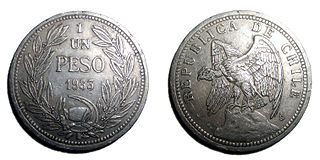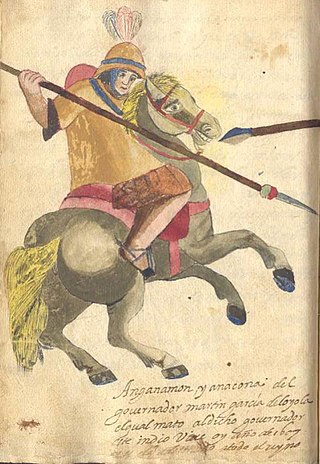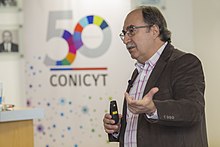Hernán Neira is a Chilean writer, philosopher and university professor.

The economy of Chile has shifted substantially over time from the heterogeneous economies of the diverse indigenous peoples to an early husbandry-oriented economy and finally to one of raw material export and a large service sector. Chile's recent economic history has been the focus of an extensive debate from which neoliberalism acquired its modern meaning.
José Luis Osvaldo Lira Pérez SS.CC. was a Chilean priest, philosopher and theologian who wrote more than 10 books on topics related to the philosophy of St. Thomas Aquinas, as well as Ortega y Gasset and Juan Vázquez de Mella. He devoted most of his life to teaching in different universities, and had as many followers as opponents.

The Destruction of the Seven Cities is a term used in Chilean historiography to refer to the destruction or abandonment of seven major Spanish outposts in southern Chile around 1600, caused by the Mapuche and Huilliche uprising of 1598. The Destruction of the Seven Cities, in traditional historiography, marks the end of the Conquest period and the beginning of the proper colonial period.

In Chilean historiography, Colonial Chile is the period from 1600 to 1810, beginning with the Destruction of the Seven Cities and ending with the onset of the Chilean War of Independence. During this time, the Chilean heartland was ruled by Captaincy General of Chile. The period was characterized by a lengthy conflict between Spaniards and native Mapuches known as the Arauco War. Colonial society was divided in distinct groups including Peninsulars, Criollos, Mestizos, Indians and Black people.

Bautista van Schouwen Vasey was a medical doctor and one of the founders of the Movement of the Revolutionary Left (MIR), the Chilean guerrilla organization which earliest resisted the Military Coup of Augusto Pinochet in 1973. Five among the "Ten most wanted" opposition figures wanted by the military government after the 11 September coup were militants of MIR. Bautista van Schouwen was at the time member of MIR's "Comisión Política" and the "Secretariado", the highest executive organ of the MIR. The military had set a reward of 500 000 Escudos to anyone who would lead them to the capture of Van Schouwen. He was abducted in Santiago December 13, 1973, in the church Parroquia Capuchinos, after having been caught when the priest who was sheltering them, unwittingly let slip to his military cousins, that they were at the church. Father Enrique White was also detained and tortured, later exiled to England. Van Schouwen and his lieutenant Patricio Munita had previously obtained clandestine refuge in the Capuchinos church-premises. They were soon after their capture killed under torture in the Army-managed detention and torture centre of Villa Grimaldi. The assassinations of Van Schouwen and Munita were however concealed by the Pinochet government and the Van Schouwen case during several years labelled as desaparecido by Human-rights organizations in Chile.
In Chile, coal mining is restricted to a few places located in its southern half. Energy originating from coal stands for 11,6% of Chile's electricity consumption. Currently the country is not considered a major producer of coal.

The Chilean land reform was a process of land ownership restructuring that occurred from 1962 to 1973 in different phases. For much of the 20th century agriculture was one of the most backward sectors of Chilean economy. The land reform was initially supported by Chilean right, centre and left political parties plus the Catholic Church and the United States. After the 1973 Chilean coup d'état the ruling right-wing dictatorship initiated a counter-reform that reverted part of it and directed Chilean agriculture into a "neoliberal" model.
El Comunista was a daily newspaper published from Antofagasta, Chile. The publication was founded by Luis Emilio Recabarren. It was published between 1916 and 1927. The newspaper was known as El Socialista until 1922. The name change followed the transformation of the Socialist Workers Party into the Communist Party of Chile. José Vega Diaz served as typographer, editor and director of El Socialista. As of 1926 Pedro Caballero was the director of El Comunista.
From 1850 to 1875, some 30,000 German immigrants settled in the region around Valdivia, Osorno and Llanquihue in Southern Chile as part of a state-led colonization scheme. Some of these immigrants had left Europe in the aftermath of the German revolutions of 1848–49. They brought skills and assets as artisans, farmers and merchants to Chile, contributing to the nascent country's economic and industrial development.
Aurora Argomedo (died 1948 in was a Chilean politician, feminist and activist, best known for her work on behalf of women's rights in Chile. She participated actively in the educational reforms of the 1910s and 1920s.

Centro de Estudios Públicos (CEP) is a non-profit Chilean think tank founded in 1980. Its stated mission is to “contribute to the development of a free and democratic society” through: 1) the analysis and dissemination of philosophical, political, social and economic problems of interest to Chilean society; 2) the study, discussion and design of public policies; and 3) the promotion of institutions that support and enable the existence of a constitutional and democratic order. CEP contributes to the public debate through its seminars, the policy brief Puntos de Referencia, the journal, Estudios Públicos which has appeared continuously since 1980, the publication of books and various research studies, as well as social surveys, which have been conducted since 1987. CEP has become a household name for political, academic, and intellectual debate.
During most of Chile's history, from 1500 to the present, mining has been an important economic activity. 16th century mining was oriented towards the exploitation of gold placer deposits using encomienda labour. After a period of decline in the 17th century mining resurged in the 18th and early 19th century this time revolving chiefly around silver. In the 1870s silver mining declined sharply. Chile took over the highly lucrative saltpetre mining districts of Peru and Bolivia in the War of the Pacific (1879–83). In the first half of the 20th century copper mining overshadowed the declining saltpetre mining.

María Julieta Kirkwood Bañados was a Chilean sociologist, political scientist, university professor and feminist activist. She is considered one of the founders and impellers of the Chilean feminist movement in the 1980s. She is considered the forerunner of Gender studies in Chile.

Agriculture in Chile has a long history dating back to the Pre-Hispanic period. Indigenous peoples practised varying types of agriculture, from the oases of the Atacama Desert to as far south as the Guaitecas Archipelago. Potato was the staple food in the populous Mapuche lands. Llama and chilihueque herding was practised by various indigenous groups.
[Chile] is rich in pastures and cultivated fields, in which all kind of animals and plants can be breed or grown, there is plenty of very beautiful wood for making houses, and plenty of firewood, and rich gold mines, and all land is full of them...

Tomás Moulian Emparanza is a Chilean political scientist and sociologist. A Guggenheim Fellow and winner of the National Prize for Humanities and Social Sciences, he is known for being a critic of the socio-economic structure of his country after the dictatorship of Augusto Pinochet.
Sonia Cristina Montecino Aguirre is a Chilean writer and anthropologist. In 2013, she was awarded the Premio Nacional de Humanidades y Ciencias Sociales

The María Elena nitrate plant is the last nitrate works still in operation in the world. It was initially named Coya Norte, but was renamed María Elena. by its founder Elias Anton Cappelen Smith. in It is located in the commune of the same name, in Chile, 220 km northeast of Antofagasta.

Celinda Arregui de Rodicio was a Chilean feminist politician, writer, teacher and suffrage activist best known for her work in favor of the rights of women in the political, social and civil spheres in Chile.
Ivonne Coñuecar is a Mapuche writer, poet and journalist from Coyhaique, Chile.










